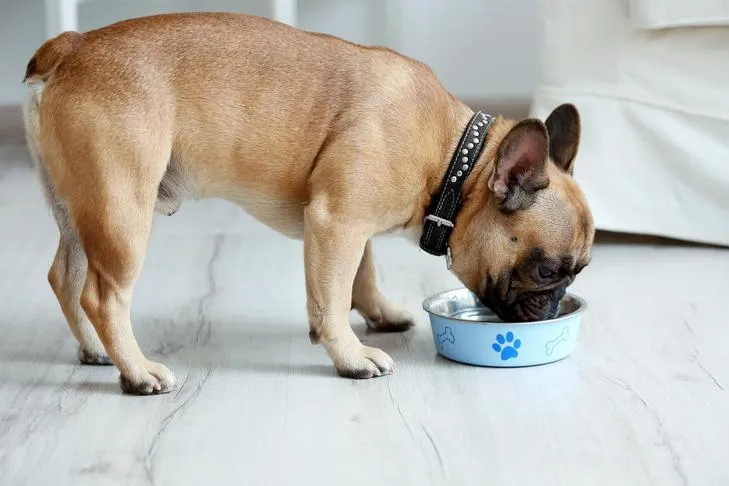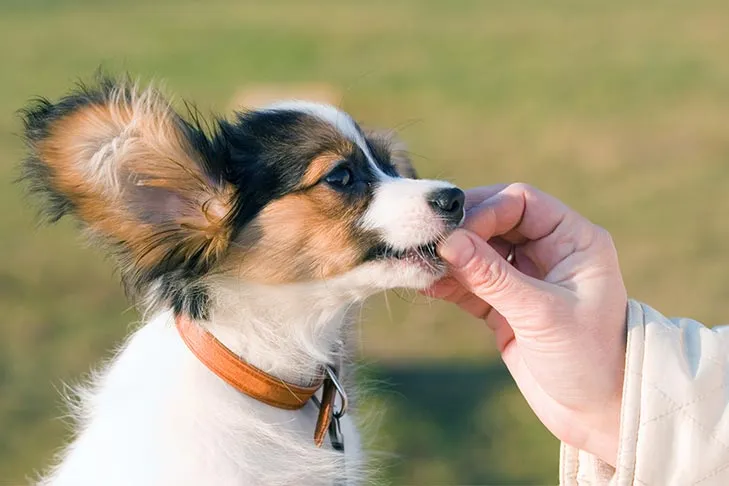As loving pet parents, we often want to share every aspect of our lives with our canine companions, and that frequently includes food. However, a dog’s digestive system is vastly different from a human’s, and many common human foods can range from harmless to highly toxic for our furry friends. Understanding what your dog can safely consume and what should be strictly avoided is crucial for maintaining their health and well-being. This guide will provide detailed insights into various human foods, helping you make informed decisions to ensure your dog enjoys a healthy and happy life. For a deeper dive into specific dietary considerations, explore what foods dogs can and cannot eat.
Human Foods Dogs Can Safely Eat (in Moderation)
Many everyday human foods can be safe and even beneficial for dogs when given in appropriate amounts and prepared correctly. These can serve as healthy treats or supplements to a balanced dog food diet. Always introduce new foods slowly and observe your dog for any adverse reactions.
Bread
Small quantities of plain bread are generally safe for dogs, provided it contains no harmful additives like spices or raisins. While bread offers no significant nutritional benefits for dogs, it’s typically harmless as an occasional, small treat. Homemade bread is a better option than store-bought varieties, which often contain unnecessary preservatives. However, due to its high carbohydrate and calorie content, bread should not be a regular part of your dog’s diet to prevent weight gain.
Cashews
Cashews can be a healthy treat for dogs in small amounts. They provide beneficial nutrients such as calcium, magnesium, antioxidants, and protein. However, despite being lower in fat than some other nuts, feeding too many cashews can contribute to weight gain and potentially lead to other health issues. Always offer unsalted cashews to avoid excessive sodium intake, which can be harmful to dogs.
Cheese
Most dogs love cheese, and it can be a great high-value treat when given in small to moderate quantities. While lactose intolerance is rare in dogs, it is possible, so monitor your dog for any digestive upset after introducing cheese. Opt for lower-fat varieties such as cottage cheese or mozzarella to prevent excessive fat intake. Many pet stores also offer dog-specific dried cheese chews, like Himalayan dog chews, which are a safe and enjoyable option.
 All American Dog resting its head on the kitchen table looking at cheese.
All American Dog resting its head on the kitchen table looking at cheese.
Coconut
This versatile fruit offers several benefits for dogs. Coconut contains lauric acid, known for its antibacterial and antiviral properties. It can also help improve bad breath and alleviate certain skin conditions, including hot spots, flea allergies, and general itchy skin. Both coconut milk and coconut oil are considered safe for canine consumption. However, ensure that any furry parts of the coconut shell are removed, as they can pose a choking hazard or cause intestinal obstruction.
Corn
Corn is a common ingredient found in many commercial dog foods, serving as a good source of carbohydrates, protein, and fiber. While the kernels are safe, corn on the cob is dangerous for dogs. The cob is difficult to digest and can cause a serious intestinal blockage, requiring emergency veterinary intervention. If you wish to share corn with your dog, always ensure it is removed from the cob.
Eggs
Cooked eggs are an excellent source of protein and can be very beneficial for dogs, especially when they have an upset stomach. They are packed with essential amino acids and vitamins. However, it’s crucial to serve eggs fully cooked. Raw egg whites contain avidin, an enzyme that can interfere with biotin absorption, potentially leading to a biotin deficiency over time. Always cook eggs thoroughly before offering them to your pet to ensure maximum safety and nutritional benefit.
Fish
Fish, particularly salmon and sardines, can be a fantastic addition to your dog’s diet due to their rich content of omega-3 fatty acids and lean protein. These nutrients support heart health, brain function, and a healthy coat. Salmon is also rich in vitamins, while sardines offer easily digestible bones, providing extra calcium. Always cook fish thoroughly and remove all tiny bones, except for sardines where the bones are soft enough to be safe. Never feed raw or undercooked fish, as it can contain parasites that are highly toxic to dogs, leading to severe illness or even death. Limit fish intake to no more than twice a week.
Ham
While ham is generally safe for dogs in small quantities, it is not the healthiest choice. It is typically high in sodium and fat, which can lead to digestive upset, pancreatitis, or long-term health issues like obesity. An occasional, small piece of plain, cooked ham without excessive fat or seasoning is acceptable as a treat, but it should not become a regular habit. For a complete understanding of what foods your dog can and cannot eat, it’s always best to consult comprehensive resources like what foods can dogs eat and cannot eat.
 French Bulldog eating from a bowl at home.
French Bulldog eating from a bowl at home.
Honey
Honey is rich in numerous nutrients, including vitamin A, potassium, calcium, magnesium, copper, and powerful antioxidants. Giving dogs small amounts of local honey may help alleviate seasonal allergies by gradually introducing small amounts of pollen, thereby building immunity. Beyond consumption, honey can also be used topically as a natural remedy for minor burns and superficial cuts due due to its antiseptic properties.
Milk
While some dogs can tolerate milk in small quantities, many are lactose intolerant and may experience digestive issues like diarrhea or an upset stomach. If you choose to offer a small amount of milk, observe your dog closely for any signs of discomfort. For most dogs, water remains the best and safest hydration source. Puppies, however, have specific milk requirements and should only consume mother’s milk or veterinary-approved milk replacers.
Peanut Butter
Peanut butter is a popular and often effective treat for dogs, providing an excellent source of protein, heart-healthy fats, and vitamins B and E. It also contains niacin, which is beneficial for overall health. The healthiest option is raw, unsalted peanut butter. Crucially, always check the label carefully to ensure the peanut butter does not contain xylitol. Xylitol is a sugar substitute that is highly toxic to dogs, even in small amounts, and can cause a rapid drop in blood sugar and liver failure.
Peanuts
Unlike almonds, which are not recommended for dogs, plain, unsalted peanuts are safe for canine consumption. They are packed with beneficial fats and proteins that can contribute to your dog’s health. However, as with cashews, moderation is key due to their fat content. Too much fat can lead to issues like pancreatitis. Always avoid salted peanuts, as excessive salt is difficult for dogs to process and can lead to salt poisoning.
Popcorn
Unsalted, unbuttered, and air-popped popcorn can be an acceptable treat for dogs in moderation. It contains riboflavin and thiamine, which support eye health and digestion, along with small amounts of iron and protein. It’s essential to ensure all kernels are fully popped, as unpopped kernels can pose a choking hazard or cause dental issues. Avoid any popcorn with added seasonings, butter, or artificial flavors.
Pork
Pork is a highly digestible protein source, rich in amino acids, and can be a good addition to a dog’s diet. It is also less likely to cause allergic reactions in some pets compared to other proteins. However, it typically contains more calories per pound than other meats, so it should be given in moderation, especially to dogs prone to weight gain. Always ensure pork is fully cooked and free of excessive fat, bones, and seasonings like onions or garlic.
 A fluffy white Samoyed puppy relaxing on lush green grass in a sunlit outdoor setting.
A fluffy white Samoyed puppy relaxing on lush green grass in a sunlit outdoor setting.
Quinoa
Quinoa has become a popular ingredient in high-quality dry dog foods due to its impressive nutritional profile. It serves as a healthy alternative to common starches like corn, wheat, and soy, offering a complete protein source and fiber. If you’re looking to introduce new grains, quinoa is a beneficial option, but always in cooked form and moderation.
Salmon
As mentioned earlier, fully cooked salmon is an excellent source of protein, beneficial fats, and amino acids, boosting joint and brain health and supporting the immune system. The critical point to remember is to never feed raw or undercooked salmon. Raw salmon contains parasites that can cause “salmon poisoning disease,” leading to severe vomiting, diarrhea, dehydration, and potentially fatal outcomes if not treated promptly. Ensure salmon is cooked thoroughly to eliminate these parasites.
Shrimp
A few fully cooked shrimp, with the shell (including tail, head, and legs) completely removed, can be a healthy occasional treat for your dog. Shrimp are low in fat, calories, and carbohydrates, while being rich in antioxidants, vitamin B-12, and phosphorus. Always ensure they are plain and cooked, never raw or seasoned.
Tuna
Cooked, fresh tuna can be given to dogs in very small amounts. It is an excellent source of omega-3 fatty acids, which promote heart and eye health. Canned tuna, if packed in water (not oil) and without added spices, can also be offered sparingly. However, canned tuna may contain small amounts of mercury and sodium, so it should not be a regular part of their diet. Excessive amounts of mercury can be harmful over time.
Turkey
Plain, cooked turkey is safe for dogs, offering a lean protein source. When preparing turkey for your dog, be sure to remove any excess fat and skin, as these can be difficult to digest and contribute to pancreatitis. Crucially, always check for bones, especially poultry bones, as they can splinter during digestion, causing internal blockages or tears in the intestines. Avoid any turkey prepared with excessive salt, seasonings, onions, or garlic.
Wheat or Grains
Contrary to popular belief, most dogs do not need to be on a grain-free diet. Grains like wheat and corn are valuable sources of protein, essential fatty acids, and fiber for many dogs. Unless your dog has a confirmed grain allergy, grains can be a healthy component of their diet. If you suspect a grain allergy, consult your veterinarian for appropriate dietary recommendations.
Yogurt
Plain yogurt is generally an acceptable and beneficial snack for dogs. The active bacteria in yogurt provide probiotics, which can help strengthen the digestive system. However, as with milk, some dogs may have difficulty digesting dairy products, so observe your dog for any signs of intolerance. Always choose plain yogurt without added sugars or artificial sweeteners like xylitol, which can be highly toxic.
 A small Papillon puppy gently taking a treat from a human hand.
A small Papillon puppy gently taking a treat from a human hand.
Human Foods Dogs Absolutely Can’t Eat
It is critical for every dog owner to be aware of foods that are toxic to dogs, as some can cause serious illness, long-term health problems, or even be fatal. Always keep these foods out of reach, and contact your veterinarian immediately if you suspect your dog has ingested any of them. For a comprehensive overview, refer to this list of what foods dogs should not eat.
Chocolate
Chocolate is highly poisonous to dogs due to a stimulant called theobromine, which dogs metabolize much more slowly than humans. Dark chocolate, baking chocolate, and cocoa powder contain higher concentrations of theobromine and are therefore more dangerous. Even small amounts can lead to vomiting, diarrhea, tremors, seizures, heart problems, and in severe cases, death. If your dog consumes chocolate, seek veterinary attention immediately.
Grapes and Raisins
The exact toxic agent in grapes and raisins is unknown, but these fruits can cause acute kidney failure in dogs. Even a small number can be dangerous, and the severity of the reaction varies greatly among individual dogs. Symptoms can include vomiting, lethargy, diarrhea, decreased appetite, and abdominal pain. It is a strict no-no for dogs and should always be avoided.
Onions, Garlic, Chives, and Leeks
All members of the Allium family (onions, garlic, chives, leeks) contain compounds that can damage a dog’s red blood cells, leading to a condition called hemolytic anemia. Whether raw, cooked, dried, or powdered, these ingredients are toxic. Symptoms may not appear for several days and can include weakness, lethargy, pale gums, increased heart rate, and difficulty breathing. Garlic is significantly more potent than onions. Avoid giving your dog any foods seasoned with these ingredients.
Xylitol
Xylitol is a sugar substitute commonly found in many sugar-free products, including chewing gum, candies, certain peanut butters, baked goods, and even some toothpastes. It is extremely toxic to dogs, causing a rapid and severe drop in blood sugar (hypoglycemia) and potential liver failure. Even a small amount can be life-threatening. Always check ingredient labels carefully, especially for peanut butter, and keep xylitol-containing products far away from your dog.
Macadamia Nuts
Macadamia nuts are toxic to dogs, though the exact mechanism of toxicity is not fully understood. Ingestion can lead to weakness, muscle tremors, vomiting, fever, abdominal pain, and hind leg paralysis. Symptoms typically appear within 3-12 hours of ingestion. While rarely fatal, prompt veterinary care is recommended if your dog eats macadamia nuts.
Avocado
Avocado contains a substance called Persin in its leaves, fruit, and seed, which can cause vomiting and diarrhea in dogs, particularly in large quantities. While dogs are more resistant to Persin than some other animals, it’s still best to avoid giving them avocado. Additionally, the large pit poses a significant choking hazard and can cause an intestinal obstruction if swallowed.
Alcohol and Caffeine
Alcohol, in any form (alcoholic beverages, raw dough with yeast, or alcohol-containing medications), can be highly toxic to dogs. Even small amounts can cause vomiting, diarrhea, decreased coordination, central nervous system depression, breathing difficulties, tremors, and even coma or death. Similarly, caffeine (found in coffee, tea, energy drinks, chocolate, and some medications) can overstimulate a dog’s nervous system and heart, leading to restlessness, hyperactivity, tremors, elevated heart rate, and seizures.
Salt
While dogs need some salt in their diet, excessive amounts can be dangerous. Foods high in salt, or even ingesting large quantities of rock salt or homemade salt dough, can lead to salt poisoning. This condition can cause vomiting, diarrhea, lethargy, excessive thirst, tremors, seizures, and potentially kidney damage or death. Always keep high-salt foods and products away from your dog.
Yeast Dough
Raw yeast dough is extremely dangerous for dogs. When ingested, the warm, moist environment of the stomach causes the yeast to ferment and produce alcohol, leading to alcohol poisoning. The dough also expands in the stomach, causing bloating, severe pain, and potentially gastric torsion (bloat), a life-threatening condition requiring emergency surgery.
Mouldy Food
Mouldy or spoiled food, often found in compost bins or discarded leftovers, can contain mycotoxins which are highly toxic to dogs. These toxins can cause severe neurological problems, including tremors, seizures, agitation, and even death. Any suspected ingestion of mouldy food warrants immediate veterinary attention.
Understanding what foods your dog can and cannot eat is a fundamental part of responsible pet ownership. While it’s tempting to share your snacks, prioritizing your dog’s safety and health means being mindful of their unique dietary needs. Always err on the side of caution. If you are unsure about a particular food, it’s best to avoid giving it to your dog. Furthermore, if you suspect your dog has ingested a toxic substance, contact your veterinarian or an emergency animal clinic immediately for advice. By staying informed and vigilant, you can ensure your beloved companion enjoys a long, healthy, and happy life, free from preventable dietary hazards. Explore more resources on what foods can dogs can not eat to continue expanding your knowledge.
